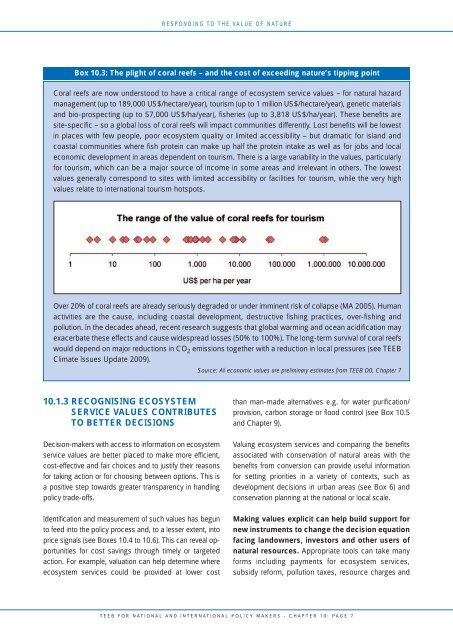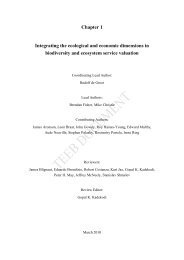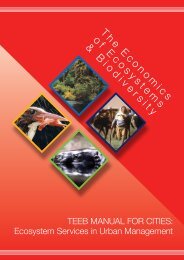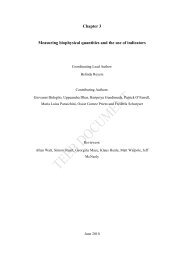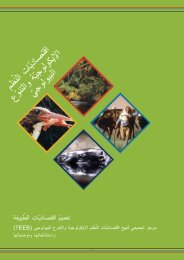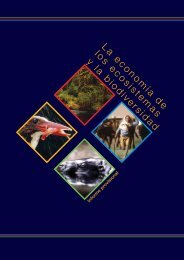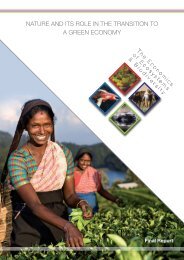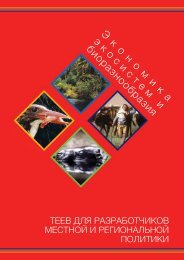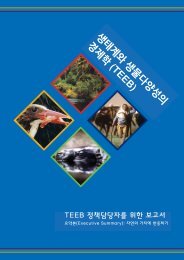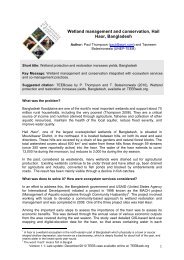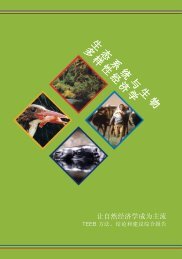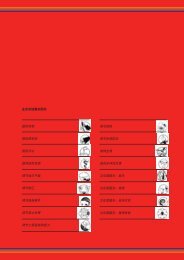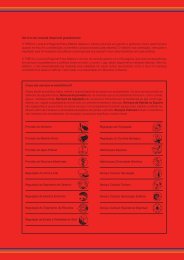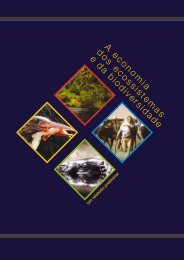Download (PDF, 6.71MB) - TEEB
Download (PDF, 6.71MB) - TEEB
Download (PDF, 6.71MB) - TEEB
You also want an ePaper? Increase the reach of your titles
YUMPU automatically turns print PDFs into web optimized ePapers that Google loves.
RESPONDING TO THE VALUE OF NATURE<br />
Box 10.3: The plight of coral reefs – and the cost of exceeding nature’s tipping point<br />
Coral reefs are now understood to have a critical range of ecosystem service values – for natural hazard<br />
management (up to 189,000 US$/hectare/year), tourism (up to 1 million US$/hectare/year), genetic materials<br />
and bio-prospecting (up to 57,000 US$/ha/year), fisheries (up to 3,818 US$/ha/year). These benefits are<br />
site-specific – so a global loss of coral reefs will impact communities differently. Lost benefits will be lowest<br />
in places with few people, poor ecosystem quality or limited accessibility – but dramatic for island and<br />
coastal communities where fish protein can make up half the protein intake as well as for jobs and local<br />
economic development in areas dependent on tourism. There is a large variability in the values, particularly<br />
for tourism, which can be a major source of income in some areas and irrelevant in others. The lowest<br />
values generally correspond to sites with limited accessibility or facilities for tourism, while the very high<br />
values relate to international tourism hotspots.<br />
Over 20% of coral reefs are already seriously degraded or under imminent risk of collapse (MA 2005). Human<br />
activities are the cause, including coastal development, destructive fishing practices, over-fishing and<br />
pollution. In the decades ahead, recent research suggests that global warming and ocean acidification may<br />
exacerbate these effects and cause widespread losses (50% to 100%). The long-term survival of coral reefs<br />
would depend on major reductions in CO2 emissions together with a reduction in local pressures (see <strong>TEEB</strong><br />
Climate Issues Update 2009).<br />
Source: All economic values are preliminary estimates from <strong>TEEB</strong> D0, Chapter 7<br />
10.1.3 RECOGNISING ECOSYSTEM<br />
SERVICE VALUES CONTRIBUTES<br />
TO BETTER DECISIONS<br />
Decision-makers with access to information on ecosystem<br />
service values are better placed to make more efficient,<br />
cost-effective and fair choices and to justify their reasons<br />
for taking action or for choosing between options. This is<br />
a positive step towards greater transparency in handling<br />
policy trade-offs.<br />
Identification and measurement of such values has begun<br />
to feed into the policy process and, to a lesser extent, into<br />
price signals (see Boxes 10.4 to 10.6). This can reveal opportunities<br />
for cost savings through timely or targeted<br />
action. For example, valuation can help determine where<br />
ecosystem services could be provided at lower cost<br />
than man-made alternatives e.g. for water purification/<br />
provision, carbon storage or flood control (see Box 10.5<br />
and Chapter 9).<br />
Valuing ecosystem services and comparing the benefits<br />
associated with conservation of natural areas with the<br />
benefits from conversion can provide useful information<br />
for setting priorities in a variety of contexts, such as<br />
development decisions in urban areas (see Box 6) and<br />
conservation planning at the national or local scale.<br />
Making values explicit can help build support for<br />
new instruments to change the decision equation<br />
facing landowners, investors and other users of<br />
natural resources. Appropriate tools can take many<br />
forms including payments for ecosystem services,<br />
subsidy reform, pollution taxes, resource charges and<br />
<strong>TEEB</strong> FOR NATIONAL AND INTERNATIONAL POLICY MAKERS - CHAPTER 10: PAGE 7


